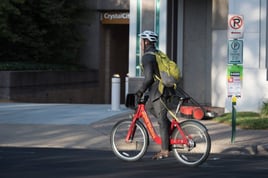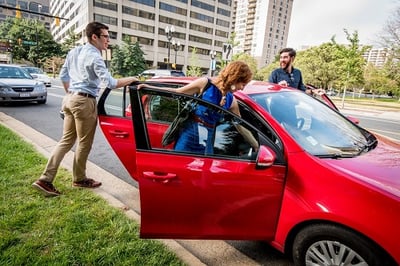Here at ATP, we are always promoting different modes of transportation that don’t involve driving alone, such as Metro, bus, carpooling, or biking. However, with the exception of carpooling and biking, these options typically don’t offer a direct, door-to-door commute for most people. Rather, most trips on public transit require riders to get to and from transit stops using some other form of transportation.
Those of us who live in the city or more urban areas usually have to walk or bike a short distance to get to a train or bus stop, then walk a few blocks to our offices at the end of the trip. As you get further out into the suburbs, however, it becomes less convenient for commuters whose homes may be located a mile or further from the nearest transit stop. In transportation-speak, this is often called the “last-mile problem” – how people can get to and from their main commuting mode.
For those who live or work further away from public transportation, the last-mile issue can make it difficult to justify the switch from driving alone, despite the financial, mental, and physical health benefits of transit. However, new infrastructure and programs in Arlington and the DC area have greatly improved connections to transit, making it easier for commuters to get around without a car. If you are dealing with the last-mile problem, here are some solutions to help make your commute as seamless as possible.
 Bike
Bike
Biking is a great option for getting to public transit. Whether your last-mile trip is half a mile or two miles, riding a bike is often the fastest, easiest way to get to your final destination. I know several people who bike 1-3 miles to the nearest Metro station, park their bike, and then take the train to work. Many Metro stations have bike lockers and racks that you can leave your bike at during the day; see which stations have bike parking here. Capital Bikeshare is also being used frequently as a last-mile solution by riders who don’t live or work directly next to a transit stop. CaBi is great for shorter trips (it’s free the first 30 minutes!) and you don’t have to worry about locking up your personal bike and leaving it during the day.
Carsharing
Car sharing programs such as Zipcar and car2go in DC can also be effective modes of transportation for short trips and last-mile commuters. Zipcars typically have parking spots by Metro stations as well as residential areas. If you’re traveling into DC for work, Car2Go lets you park anywhere, not just a specified carsharing spot.
 Carpool
Carpool
For commuters who live in more suburban areas, perhaps you can find a neighbor or coworker who lives nearby to carpool to a Metro station or commuter bus park and ride lots. This can help cut down on parking costs and reduce the number of cars on the roads during rush hour.
Make your last-mile your workout!
In addition to biking, you can always walk to your final destination (or adopt a running commute) and get some exercise out of your commute! As we’ve mentioned recently, studies have shown that transportation and health are directly linked, and how you get to work each day can have a significant impact on your waistline. Incorporating active transportation into your last-mile trip can help you get the recommended weekly physical activity while traveling to and from public transit.
While the above strategies may not work for everyone, they are good options for shorter trips and can make connections with public transit more simple and easy. Would these work for you? We’d love to hear how you solve your “last-mile problem”!

